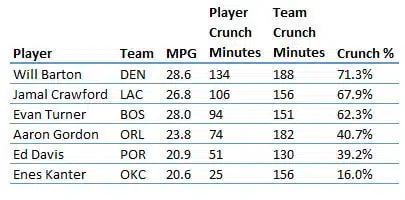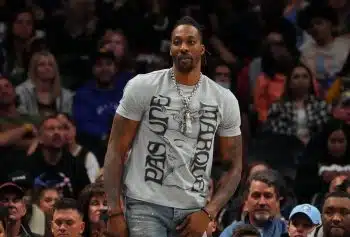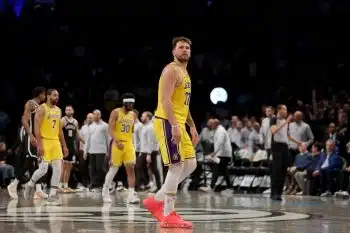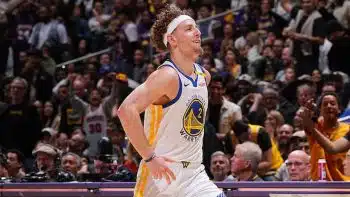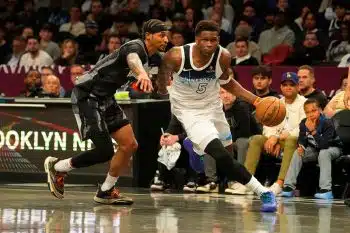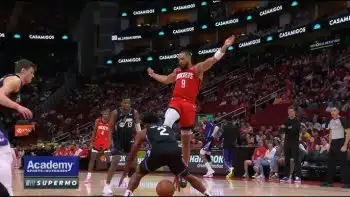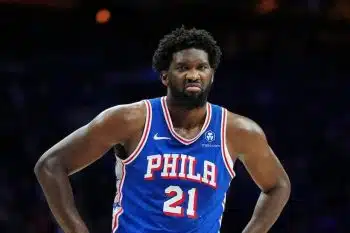NBA
A Closer Look: Iguodala as Sixth Man of Year
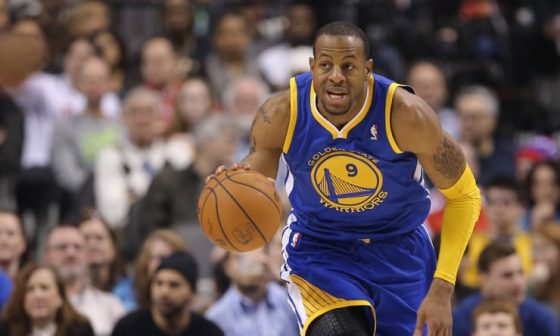
Former players and television analysts alike continue to fruitlessly (and hilariously) fight the numbers movement in the NBA, but even the staunchest among them can’t deny the cumulative advances in basketball understanding made over the last decade-plus. It requires no advanced mathematics degree to get on board with the idea that there are more descriptive qualifiers of a player’s strengths and weaknesses than a two-number per-game average (Player A averages 17-10) or a single, context-absent counting stat. Even if you don’t subscribe to some of the heavier empirical metrics out there, the consciousness of the average fan has reached this point.
It’s strange, then, that the voting process for the league’s most prestigious awards still often reflects an electorate stuck in a more primitive time – despite its ostensible status as a collection of relatively highly informed basketball minds.
Rest easy, beat writer friends around the country – this isn’t a shot at any of you. Rather, it’s a recognition of a simple fact: A voter group comprised almost exclusively of people whose job is to watch and catalogue a single team in copious detail often won’t do a good job accurately researching and voting on awards that involve 29 other teams’ worth of players. It’s not a question of commitment, but one of available time and job description.
What often results is a shorthand of sorts; those with understandable time constraints look to simpler, less time-consuming ways to make the process easier for them. This can manifest itself in word-of-mouth evaluation, small memory samples (typically the few games per year a given voter saw a given opponent) or, by far the most common symptom, over-reliance on the low-hanging fruit represented by simple counting stats (particularly points per game).
Nowhere is this reality more readily apparent than in recent voting for the NBA’s Sixth Man of the Year award. A table from Hardwood Paroxysm’s Jacob Rosen in a recent article on the subject showcases the somewhat incredible degree to which voters gravitate toward scoring alone within the confines of this particular award: No winner in the last 14 years finished outside the top three in scoring among eligible candidates, and only on one single occasion did any top-three selection for Sixth Man average single-digit nightly points (Anderson Varejao finished third in 2009-10 while scoring 8.6 points per game).
An examination of each individual race would surely reveal that this bias rewarded the “right” guys on many occasions, but it’s plain to the naked eye how this sort of extreme reliance can lead to issues. While it’s understandable that points are the first go-to for many while evaluating players given their importance on the scoreboard, it’s very strange to see such an overuse persist even as it’s exorcised from most areas of general basketball consciousness. There are better ways of determining player value, whether a guy starts or comes off the bench.
Andre Iguodala doesn’t average a gaudy point total. Given the roster around him, it’d be a bit silly if he did. His 7.1 points per game are all the Warriors need from him, with myriad other duties on his plate that mean more to team success. A couple decades ago, tracking and understanding the impact of these other elements of Iguodala’s game might have been tough given available resources. Today, it’s a couple clicks away and frankly it’s becoming a bit strange to see these resources widely ignored in some circles.
Under the simple assumption that NBA awards like Most Valuable Player, Rookie of the Year and Sixth Man of the Year are attempts to qualify overall value added by a player within the category, the fact that Iguodala trails guys like Jamal Crawford and Enes Kanter – gunners who have demonstrably hurt their teams in vital areas while on the court – on many hypothetical ballots is nearly laughable at this point. At best, it’s a recognition that Iguodala’s impact is harder to quantify empirically (probably lazy, but somewhat fair); at worst it’s conscious ignorance, not of some complex analytical rocket science, but of basic arithmetic and basketball logic.
Crawford is a popular name with a glorious history as the prototypical “sixth man,” a guy who comes in and props up bench units with mostly individual creation and shot-making. Many NBA players even feel Crawford deserves the Sixth Man of the Year award for a record third time, as Basketball Insiders’ Alex Kennedy detailed here. Here’s the problem: He hasn’t propped up anything but opponent plus-minus figures this year. He’s having his worst year as a Clipper by a wide margin, and arguably his worst overall season since his rookie year in 2000-01.
Crawford barely nudged himself over 40 percent from the field in the last week or so, and is assisting on the lowest percentage of teammate baskets in his entire career. Worse yet has been his team impact – a small drop-off while Crawford plays would be understandable given the top-heavy nature of this Clippers team, but the degree to which L.A. improves when he leaves the floor is staggering. ESPN’s Real Plus-Minus, a metric designed to weed out teammate and opponent noise in this category, places him 73rd overall among 97 shooting guards (Iguodala rates eighth among 81 small forwards – the highest of all realistic Sixth Man of the Year hopefuls excepting Portland’s Ed Davis, who’s a fringe candidate).
RPM hates Kanter too, rating him 53rd among 77 centers – and dead last among these 77 for isolated defensive RPM, even behind rookie Jahlil Okafor in Philadelphia. This metric is far from an end-all and isn’t perfect, but it suggests (strongly, given the gap between Kanter and nearly everyone else at his position) that he’s among the most detrimental defensive players in the NBA, if not the very worst. Should a few extra points and rebounds a game next to his name really smother the blatant reality that Kanter damages his team on one side of the ball more than his value impact suggests he helps on the other?
There are other semi-realistic choices without such glaring holes in their candidacies, but Iguodala’s overall impact swallows them up. An injury that caused him to miss just under 20 games comes up most often as a detractor to his case, and while it certainly doesn’t help, a few bits of context beg attention. Easiest is the fact that his minute totals are still comparable to other major candidates – Iguodala played just 18 fewer minutes on the year than Kanter prior to Wednesday’s games, and wasn’t so wildly far behind others that his broad impact can be ignored.
More importantly, though, one must consider the circumstance and quality of the minutes played. The timing of Iguodala’s injury means he was active for a huge percentage of the most important minutes and games played by Golden State this year (from a strict standings perspective, excluding their run for 73). Through March 11, Iguodala’s final game before his stretch on the sidelines, the Warriors were 58-6, all but locking up the top seed in the West. It absolutely matters more that he was present for their historic first few months, a stretch that furthered their title goals significantly more than their results during the time he missed.
The in-game importance of the minutes he played also stands out from his peers, an even more vital consideration. Iguodala is a constant presence in crunch time for a team that’s been historically dominant during these high-leverage situations – none of his competition for the award even comes all that close. Take a look at this chart, gratefully borrowed from Matt Femrite in a recent blog post, which shows the percentage of team crunch minutes played by various other Sixth Man of the Year candidates as of early April:
Iguodala’s total before his injury was 89 percent, mostly as part of the most dominant single lineup in NBA history. Not only does Iguodala close tight games much more often than his competition (over four times as often as Kanter, for instance), he plays a vital role, defending top opposing wings in every situation and often sliding up or down a position to check a particularly potent ball-handler.
If the quantifiable aspects make the point, the intangibles drive it home. Iguodala isn’t a flashy shooter like teammates Steph Curry and Klay Thompson or an uber-talented spark plug like Draymond Green, but his value to his team is much closer to these other three than most would believe. He’s nearly as indispensable to “the Death Lineup” as Draymond, a long and versatile defender who doesn’t need to see the ball at all to make a significant impact. It’s an imperfect science, but a look at other variations of the Curry-Thompson-Barnes-Iguodala-Green unit that’s destroyed the league suggests that removing Iguodala is more damaging than swapping any other single piece besides Curry (yes, including Green).
Maybe it’s unreasonable to expect the electorate to consider all the detail herein. Maybe it’s not. The answer likely depends on who you talk to, including those who believe the voting process should be scrapped altogether and started fresh. That’s a conversation for another time, but this pen would be in support of any changes that encouraged real research and effort by those voting. Sure, they aren’t NBA championship rings, but these awards mean real things to the players considered – from pride and legacy concerns all the way to a real, tangible impact on the checkbook in many cases.
In the short-term, here’s hoping the current voter group makes the right call. No primary bench player has added anywhere near as much value to their team as Andre Iguodala this season, particularly with any weight whatsoever given to the high-leverage minutes that often separate the champions from the also-rans. Give the man the hardware.
